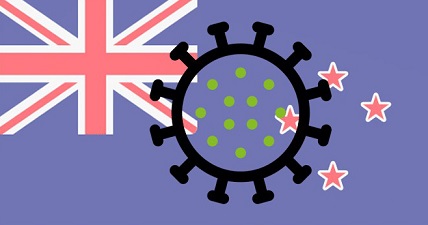COVID-19 News: SARS-CoV-2 Crisis In New Zealand Escalating As Weekly Infections Hits More Than 8040 With 324 Hospitalized
Nikhil Prasad Fact checked by:Thailand Medical News Team Jan 16, 2024 1 year, 2 months, 1 week, 3 days, 11 hours, 33 minutes ago
COVID-19 News: New Zealand finds itself in the throes of an escalating crisis as the fifth wave of COVID-19 sweeps across the nation. The impact has been particularly severe in Auckland, where 2,766 active cases are concentrated. Local
COVID-19 News reports and even television coverages are indicating that hospitals in Auckland are beginning to once again be overwhelmed with ER departments bearing most of the brunt.
 COVID-19 Crisis Escalating In New Zealand
COVID-19 Crisis Escalating In New Zealand
The latest statistics reveal an alarming surge, with 8,040 new cases reported in the past week, presenting an average of 1,146 cases daily - a stark reminder of the relentless nature of the current outbreak.
https://www.tewhatuora.govt.nz/our-health-system/data-and-statistics/covid-19-data/covid-19-current-cases/
Reinsfections Compound the Challenge
Amid the rising numbers, a concerning aspect emerges - 4992 out of the 8040 new infections in the last week were reinfections with 74 individuals among the reported cases having been reinfected within 90 days of their prior infection. This phenomenon adds a layer of complexity to the challenges faced by health authorities, hinting at potential complications in immunity and the evolving nature of the virus.
Strain on Healthcare System - Hospitalizations and Deaths
The surge in cases translates into an increased burden on the healthcare system. As of the latest data, 324 individuals are hospitalized, with six in intensive care. The seven-day rolling average for COVID-19-related deaths has climbed to 11, underscoring the severity of the crisis. This strain on hospitals emphasizes the need for effective management and resource allocation to ensure adequate care for those in need.
It should be also noted that excess death in New Zealand have also been rising at exponential rates indicating that COVID-19 could actually be contributing to more deaths that actually reported.
Omicron Subvariant JN.1 - A Contributing Factor
Epidemiologist Dr Michael Baker attributes the record surge in New Zealand to the emergence of a new subvariant - JN.1, a mutation of the Omicron strain. JN.1 has rapidly become the predominant variant in various countries, including the United States. This development raises concerns about the potential increased transmissibility or immune evasion associated with this subvariant, adding a layer of complexity to the ongoing battle against the virus.
Wastewater Surveillance - A Harbinger of the Crisis
ESR wastewater surveillance reveals a grim reality. In the week ending January 7, the national average of virus copies detected per person, per day, reached 8.59 million.
https://esr-cri.shinyapps.io/wastewater/#region=Wellington&log_or_linear=linear&a
mp;period=twelveMonthsButton
This threefold increase from mid-spring and surpassing December's peak values indicates the pervasive presence of the virus within communities. The data underscores the challenges of controlling the spread and the need for robust public health measures.
Regional Impact - Auckland and Canterbury Under Pressure
Auckland remains at the epicenter of the crisis, grappling with 2,766 active cases reported cases across counties Manukau, Auckland Central, and Waitematā.
Canterbury, not far behind, reports 884 active cases, highlighting the widespread impact of the virus across regions. The regional variations emphasize the need for targeted interventions and resources to address the varying degrees of impact on local healthcare systems.
Decision Dilemma - Free RATs at Risk
As the crisis unfolds, health authorities face the challenging decision of potentially discontinuing the distribution of free Rapid Antigen Tests (RATs) at pharmacies. The current policy allows free access to RATs until the end of February 2024. Te Whatu Ora emphasizes that a decision on extending free access is under consideration and will be communicated once finalized. This decision carries significant implications for testing accessibility and community-level monitoring.
Healthcare Professionals' Concern s- High Respiratory Infections
Healthcare professionals are grappling with an influx of patients presenting with respiratory infections. General practitioners report a substantial increase in respiratory cases, with approximately a quarter of all presentations in the first 10 days of 2024 attributed to such infections. This surge places additional strain on primary healthcare services, necessitating a coordinated response to manage the evolving healthcare needs.
Current Fifth Wave Expected To Last Longer
Experts predict that the current fifth wave is not expected to peak anytime soon but rather the surge might last till end of February or even as long as early April as many other newer JN.1 spawns are also emerging and reinfecting individuals who had the JN.1 infection! Among some of these spawns are JN.1.1, JN.1.2, JN.1.4, JN.1.6.1, JN.1.11, JN.4, JN.5, JN.6, JN.7. JN.8, JN.9 etc.
https://twitter.com/ThailandMedicaX/status/1746370110645039233
Future Outlook - Uncertain Trajectory and Government Review
Covid-19 modeler Professor Michael Plank, an Otago University epidemiologist urges caution regarding any premature optimism as he predicts that the COVID-19 crisis in New Zealand is further expected to escalate in coming weeks.
Also, unlike previous waves where the elderly has been more susceptible, the current surge is indicating that the general population across all age groups irrespective of vaccine status are vulnerable. There are also signs that pediatric COVID-19 hospitalizations are increasing.
The highly mutated Omicron subvariant JN.1 is suspected to play a significant role in sustaining high infection rates, potentially contributing to more than half of the reported cases. The government is reviewing the strategy for face masks and Rapid Antigen Tests (RATs) beyond February, acknowledging the evolving nature of the crisis.
Conclusion- Navigating the Complexity of a Prolonged Battle
As New Zealand confronts this formidable challenge, the nation remains on high alert, navigating the complexities of a prolonged and evolving battle against the SARS-CoV-2 virus. With a surge in cases, the emergence of a concerning subvariant, and decisions looming over testing accessibility, effective management and communication are paramount. The uncertain trajectory of the crisis underscores the need for a coordinated and adaptive response to safeguard public health.
For the latest
COVID-19 News, keep on logging to Thailand Medical News.
